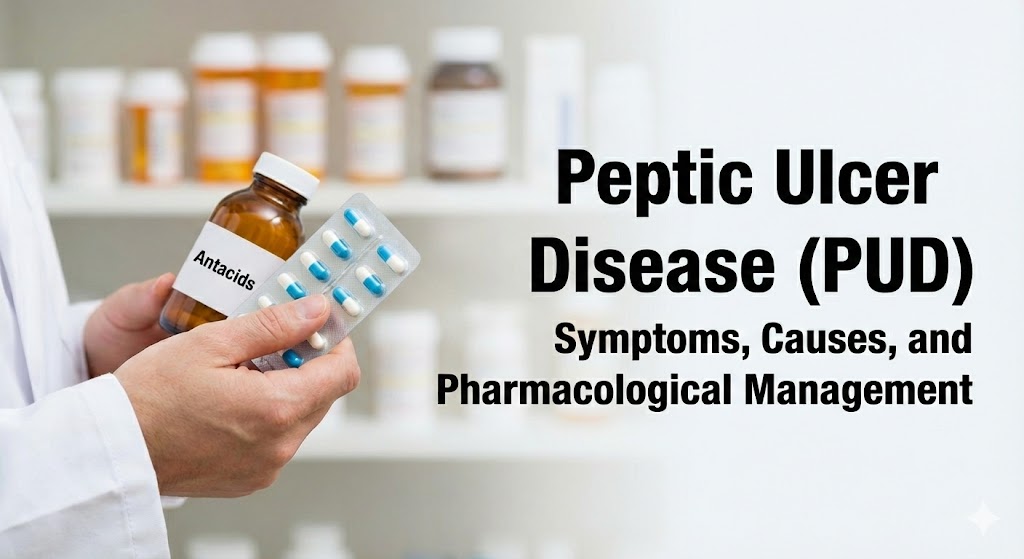Introduction
Peptic Ulcer Disease (PUD) is a gastrointestinal disorder characterized by sores or lesions in the lining of the stomach or duodenum. It is a significant health concern worldwide, affecting a broad demographic.
Pathophysiology
Peptic ulcers result from an imbalance between mucosal defensive factors (like mucus and bicarbonate secretion) and aggressive factors (such as gastric acid and pepsin). This imbalance leads to mucosal damage and ulcer formation.

Key Causes
- Helicobacter pylori Infection: This bacterium colonizes the gastric mucosa, causing chronic inflammation and increasing vulnerability to acid, leading to ulcers. It’s the most common cause of PUD [1-3].
- Nonsteroidal Anti-Inflammatory Drugs (NSAIDs): These drugs inhibit the production of prostaglandins, which protect the gastric mucosa. Their prolonged use disrupts mucosal integrity, leading to ulceration [1-3].
- Other Factors: Additional causes include hypersecretory conditions like Zollinger-Ellison syndrome, lifestyle factors (smoking, alcohol), stress, and other medications (corticosteroids) [2, 3].
Clinical Manifestations
Symptoms vary, ranging from asymptomatic to severe, including [1-4]:
- Persistent burning or gnawing stomach pain, often relieved by eating or antacids.
- Bloating, belching, and nausea.
- Vomiting, sometimes with blood.
- Dark or bloody stools.
- Weight loss and reduced appetite in severe cases.
Diagnostic Approach
Diagnosis involves a combination of clinical assessment and diagnostic tests:
- Endoscopy: Direct visualization of the ulcer; biopsy may be performed for H. pylori detection.
- Barium X-ray: Less commonly used, provides images of the upper digestive system.
- H. pylori Testing: Includes urea breath test, stool antigen test, and blood serology [4].
Treatment Modalities
Treatment depends on the cause and severity of the ulcer:
- Eradicating H. pylori: Combination therapy with two antibiotics and a proton pump inhibitor (PPI) or bismuth subsalicylate.
- Reducing Acid Production: PPIs and H2-receptor antagonists.
- Protecting the Mucosa: Medications like sucralfate and misoprostol.
- Lifestyle Modifications: Avoiding NSAIDs, reducing alcohol intake, quitting smoking.
- Surgery: Rarely required, used in cases of complications like perforation or uncontrolled bleeding [1-4].
Complications
Potential complications include:
- Gastrointestinal bleeding, evident from hematemesis or melena.
- Perforation, leading to acute peritonitis.
- Gastric outlet obstruction due to scarring and swelling.
- Increased risk of gastric cancer, particularly with chronic H. pylori infection [2, 3].
Prevention and Management
Preventive strategies focus on reducing risk factors:
- Limiting NSAID use.
- Lifestyle changes like smoking cessation and moderate alcohol use.
- Effective management of H. pylori infection [1-4].
Conclusion
Peptic ulcer disease, primarily driven by H. pylori infection and NSAID use, is a manageable condition. Early diagnosis, appropriate treatment, and lifestyle modifications are key to effective management and prevention of complications.
References
- Mayo Clinic. Peptic Ulcer [Internet]. Mayo Clinic; 2022 [cited 2023 Nov 20]. Available from: https://www.mayoclinic.org/diseases-conditions/peptic-ulcer/symptoms-causes/syc-20354223
- Cleveland Clinic. Peptic Ulcer Disease [Internet]. Cleveland Clinic; 2023 [cited 2023 Nov 20]. Available from: https://my.clevelandclinic.org/health/diseases/10350-peptic-ulcer-disease
- National Institute of Diabetes and Digestive and Kidney Diseases. Peptic Ulcers (Stomach Ulcers) [Internet]. NIDDK; 2023 [cited 2023 Nov 20]. Available from: https://www.niddk.nih.gov/health-information/digestive-diseases/peptic-ulcers-stomach-ulcers/symptoms-causes
- WebMD. Peptic Ulcer Overview [Internet]. WebMD; 2023 [cited 2023 Nov 20]. Available from: https://www.webmd.com/digestive-disorders/peptic-ulcer-overview
For detailed information and pharmacotherapy visit this page:
Medical Disclaimer
The medical information on this post is for general educational purposes only and is provided by Pharmacology Mentor. While we strive to keep content current and accurate, Pharmacology Mentor makes no representations or warranties, express or implied, regarding the completeness, accuracy, reliability, suitability, or availability of the post, the website, or any information, products, services, or related graphics for any purpose. This content is not a substitute for professional medical advice, diagnosis, or treatment; always seek the advice of your physician or other qualified health provider with any questions you may have regarding a medical condition and never disregard or delay seeking professional advice because of something you have read here. Reliance on any information provided is solely at your own risk.

